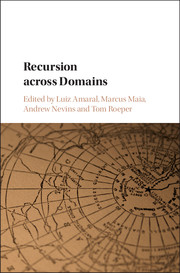
-
Select format
-
- Publisher:
- Cambridge University Press
- Publication date:
- 05 June 2018
- 07 June 2018
- ISBN:
- 9781108290708
- 9781108418065
- 9781108406260
- Dimensions:
- (228 x 152 mm)
- Weight & Pages:
- 0.69kg, 404 Pages
- Dimensions:
- (229 x 152 mm)
- Weight & Pages:
- 0.58kg, 408 Pages
You may already have access via personal or institutional login
Book description
Recursion and self-embedding are at the heart of our ability to formulate our thoughts, articulate our imagination and share with other human beings. Nonetheless, controversy exists over the extent to which recursion is shared across all domains of syntax. A collection of 18 studies are presented here on the central linguistic property of recursion, examining a range of constructions in over a dozen languages representing great areal, typological and genetic diversity and spanning wide latitudes. The volume expands the topic to include prepositional phrases, possessives, adjectives, and relative clauses - our many vehicles to express creative thought - to provide a critical perspective on claims about how recursion connects to broader aspects of the mind. Parallel explorations across language families, literate and non-literate societies, children and adults are investigated and constitutes a new step in the generative tradition by simultaneously focusing on formal theory, acquisition and experimentation, and ecologically-sensitive fieldwork, and initiates a new community where these diverse experts collaborate.
Reviews
'In the light of recent claims according to which syntactic recursion is the defining property of natural language, this volume offers an excellent collection of contributions dealing with the issue of how to detect and define recursion across syntactic domains and different languages. Since many chapters provide a comparison between languages that have been in the focus of recent debates on recursion and indigenous languages of Brazil, the book is a 'must read' for linguists interested in the issue of recursion from a typological perspective.'
Andreas Trotzke - Universität Konstanz, Germany
Contents
Metrics
Altmetric attention score
Full text views
Full text views help Loading metrics...
Loading metrics...
* Views captured on Cambridge Core between #date#. This data will be updated every 24 hours.
Usage data cannot currently be displayed.
Accessibility standard: Unknown
Why this information is here
This section outlines the accessibility features of this content - including support for screen readers, full keyboard navigation and high-contrast display options. This may not be relevant for you.
Accessibility Information
Accessibility compliance for the HTML of this book is currently unknown and may be updated in the future.


